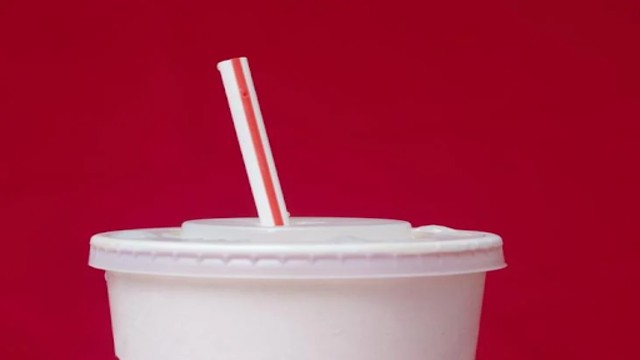
A large soft drink with a plastic straw from a McDonald’s restaurant is shown in Surfside, Fla., May 2018. (AP Photo)
President Donald Trump has signed an executive order banning federal agencies from using paper straws, (the reversal of plastic straw ban) declaring them ineffective. Instead, he wants the government to return to plastic straws, arguing they are more durable and practical.
“It’s a ridiculous situation. We’re going back to plastic straws,” Trump announced as he reversed federal purchasing policies that had restricted plastic and encouraged paper alternatives. His order directs federal agencies to cease buying paper straws and ensure they are no longer available in government buildings.
This move directly challenges a policy introduced under President Joe Biden. The Biden administration had planned to phase out single-use plastics, including straws, from federal food services and events by 2027, and from all government operations by 2035. Trump called this initiative “DEAD!” in a social media post.
Plastic straws have long been criticized for polluting oceans and endangering marine life. Environmentalists argue that single-use plastics contribute significantly to global pollution, breaking down into microplastics that harm wildlife and even enter human bodies. However, Trump dismissed these concerns. “I don’t think plastic affects the shark very much as they’re eating their way through the ocean,” he remarked.
Many U.S. states and cities have already banned plastic straws, while some restaurants only provide them upon request. Yet, experts emphasize that straws are just a small part of the larger plastic waste issue. Single-use plastic items—such as bottles, bags, and takeout containers—are flooding the environment.
Globally, an estimated one garbage truck worth of plastic enters the ocean every minute. Over time, these plastics degrade into tiny particles, which have been detected in fish, birds, and even human tissue. The production of plastic also releases greenhouse gases and harmful pollutants, as over 90% of plastics are derived from fossil fuels like oil and natural gas.
Despite growing efforts worldwide to reduce plastic consumption, Trump’s decision stands in contrast to sustainability goals set by many corporations and governments. Environmental groups have strongly criticized his order.
“Trump is moving in the wrong direction on single-use plastics,” said Christy Leavitt, plastics campaign director at Oceana. “The world is facing a plastic pollution crisis, and ignoring this problem only makes things worse.”
Meanwhile, the plastics industry welcomed Trump’s move. Matt Seaholm, CEO of the Plastics Industry Association, called it the start of a larger shift. “‘Back to Plastic’ is a movement we should all get behind,” he stated.
According to the Straws Turtle Island Restoration Network, Americans use over 390 million straws daily. These straws, which last for centuries, pose a significant threat to marine life. The group urged people to adopt lifestyle changes to protect species affected by plastic waste.
On a global scale, efforts are underway to address plastic pollution through international agreements. Last year, world leaders met in South Korea to negotiate a treaty but failed to reach a consensus. Talks will resume this year, with over 100 countries advocating for limits on plastic production, improved recycling, and pollution control.
Despite these efforts, Trump’s order signals a return to traditional plastic use in federal agencies, reversing a key environmental policy from the Biden administration.















